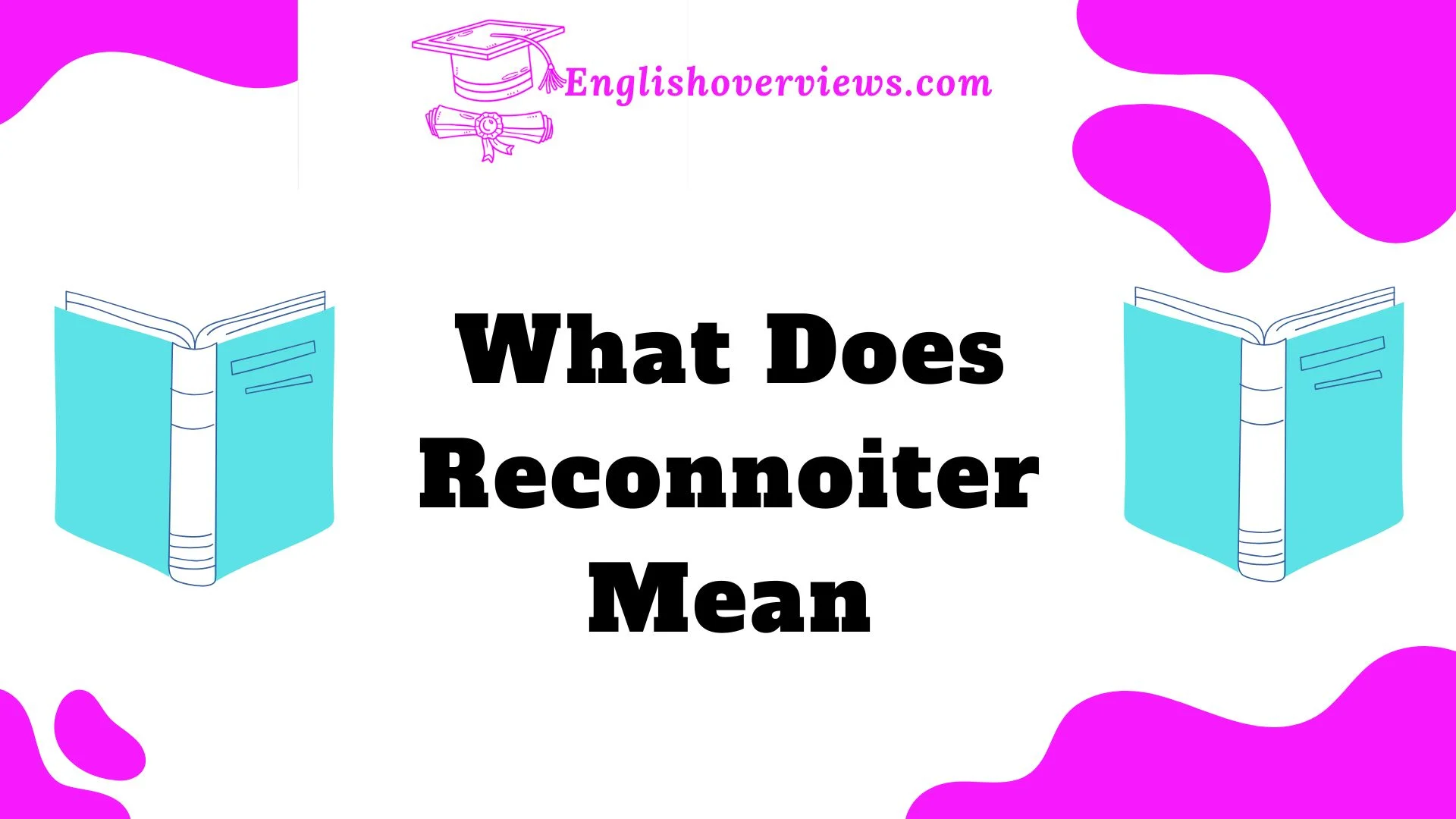Have you ever wondered about the meaning of the word “reconnoiter”? At first glance, it may seem like an obscure term reserved for history books or military manuals, but it’s far more versatile than you might think.
Whether you’re exploring new territory, assessing a business opportunity, or simply checking out a place before making a decision, the concept of reconnoitering is surprisingly relatable.
The word has its roots in military strategy but has evolved over time to find its place in everyday vocabulary. In this post, we’ll uncover the definition, historical background, synonyms, and practical applications of “reconnoiter” across various fields.
We’ll also share real-world examples, explore its relevance in modern times, and even show you how to use it in a sentence with confidence.
So, let’s get started and discover why “reconnoiter” is more than just a fancy word—it’s a concept that has shaped decision-making for centuries.
Definition of Reconnoiter
At its most basic, the term “reconnoiter” means to survey or explore an area, usually to gather information for strategic purposes. It’s a deliberate and often systematic process of observation.
Here’s a straightforward definition:
“To reconnoiter is to observe, inspect, or explore an area, often with the intent to gather information for planning or decision-making.”
Key Characteristics of Reconnoitering
- Purpose-Driven: Reconnoitering is always done with a specific goal in mind, whether it’s assessing risks or identifying opportunities.
- Detail-Oriented: It involves careful observation and documentation.
- Strategic: This term is commonly used in contexts that require forethought and planning.
Example in Simple Terms
If you’ve ever checked out a restaurant’s menu online before deciding to dine there, you’ve essentially “reconnoitered” the place.
Did You Know?
The word “reconnoiter” is closely linked to the term “reconnaissance,” which refers to the broader mission or activity of gathering information.
Quick Reference Table
| Attribute | Details |
| Part of Speech | Verb |
| Common Usage | Moderate (professional and casual) |
| Associated Fields | Military, Business, Exploration |
| Key Synonyms | Scout, Survey, Inspect, Explore |
Etymology and Origins of Reconnoiter
The word “reconnoiter” traces its origins to the French term “reconnoître,” which means “to recognize or examine.” The French, in turn, borrowed from the Latin word “recognoscere” (to know again).
Key Milestones in Its Evolution
- 16th Century France: The term was primarily used in military contexts to describe scouting missions.
- 17th Century Adoption: It entered the English language, retaining its military roots but gradually expanding into other areas.
- Modern Adaptations: Today, it’s used across fields like business, real estate, and even casual conversation.
Why French and Latin Matter
French influence on English during the Norman Conquest (1066) introduced many words related to governance and military strategy, including “reconnoiter.” Its Latin root, “recognoscere,” highlights the concept of “knowing again” or revisiting something to gather further understanding.
Historical Background of Reconnoiter
Military Origins
Historically, the act of reconnoitering has been essential for military success. Armies relied on scouts and reconnaissance missions to survey enemy movements, assess terrain, and minimize risks.
Famous Examples of Reconnoitering in History
- Napoleonic Wars: Napoleon’s generals frequently reconnoitered battlefields to plan troop movements.
- American Revolutionary War: George Washington often employed spies and scouts to reconnoiter British forces.
- World War II: Reconnaissance missions, such as aerial photography, were critical in planning D-Day operations.
Case Study: The Battle of Gettysburg
During the American Civil War, Confederate General Robert E. Lee relied on faulty reconnaissance before the Battle of Gettysburg. His troops lacked accurate information about Union positions, leading to one of the most decisive defeats of the war. This highlights the importance of accurate reconnoitering in strategic planning.
Beyond the Battlefield
While its military applications are prominent, the concept of reconnoitering has influenced fields like geography, urban planning, and exploration. For example:
- Lewis and Clark Expedition: The explorers surveyed vast territories, mapping out routes and documenting resources.
- Early Settlements: Pioneers often reconnoitered areas to determine suitable locations for farming and settlement.
Synonyms and Related Terms
Common Synonyms
| Word | Subtle Difference |
| Scout | Informal or preliminary exploration |
| Survey | Broader, often includes measurement or documentation |
| Inspect | Focused, detailed examination |
| Explore | General discovery or investigation |
Why Context Matters
While all these terms overlap, their usage depends on the level of formality and purpose. For example, “survey” is often associated with scientific or technical studies, while “scout” has a more casual tone.
Related Terms in Military Jargon
- Reconnaissance: A broader activity involving observation and intelligence gathering.
- Patrolling: Actively moving through an area to monitor or secure it.
- Observation Post (OP): A stationary position used to reconnoiter enemy movements.
Practical Usage of Reconnoiter
How to Use Reconnoiter in a Sentence
Here are a few examples to show how you can incorporate the term into your vocabulary:
- “The engineers reconnoitered the site to assess its suitability for construction.”
- “Before investing in the startup, the venture capital team reconnoitered the market to identify potential risks.”
- “The hikers decided to reconnoiter the trail before embarking on their full journey.”
Everyday Applications
- Travel Planning: Checking out a neighborhood or hotel online before booking.
- Event Organization: Surveying venues to find the best fit for an occasion.
- Personal Decisions: Exploring a new hobby or activity before fully committing.
Reconnoiter in Modern Contexts
Digital Reconnoitering
In the 21st century, reconnoitering has evolved into the digital realm. From businesses scouting competitors online to cybersecurity experts analyzing potential threats, the concept remains as relevant as ever.
Real-World Example: Cybersecurity Reconnoitering
Cybersecurity teams frequently reconnoiter networks to identify vulnerabilities. For example, penetration testers simulate attacks to uncover weak points, ensuring robust defenses.
Visual Aid: Comparing Synonyms
| Term | Definition | Example Context |
| Reconnoiter | Strategic survey of an area | “Reconnoitering the site before building” |
| Scout | Informal, initial exploration | “Scouting for a good picnic spot” |
| Survey | Detailed measurement or analysis | “Surveying land for a construction project” |
FAQs About Reconnoiter
Q1: Is “reconnoiter” still used in military contexts?
Yes, it’s a vital term in military strategy, particularly in reconnaissance missions.
Q2: What’s the difference between “reconnoiter” and “reconnaissance”?
“Reconnoiter” refers to the act of observing, while “reconnaissance” describes the broader mission or operation.
Q3: Can “reconnoiter” be used in casual conversation?
While formal, it can add depth to casual contexts, especially when discussing planning or exploration.
Q4: Are there modern synonyms for “reconnoiter”?
Yes, common synonyms include “scout,” “survey,” and “inspect.”
Q5: How do businesses use reconnoitering today?
Businesses reconnoiter competitors, markets, and customer preferences to gain strategic advantages.

English Overviews is a resourceful website dedicated to providing valuable content related to grammar and vocabulary. AD has made notable contributions, sharing insights on various subjects, including WordPress themes and plugins. The primary goal of the site is to help users improve their English language skills effectively.











